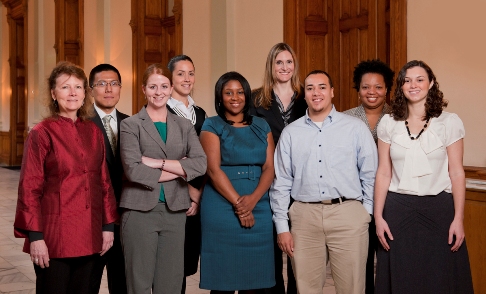Center for Law, Health & Society | News and Events | Center News | 2011 Archive | Students Learn First-Hand About Law-Making at the State Capitol Students Learn First-Hand About Law-Making at the State Capitol
March 10, 2011
ATLANTA - Professor Sylvia B. Caley, Assistant Clinical Professor and co-Director of the HeLP Legal Services Clinic, offers law students the unique opportunity to research and draft legislation for real clients to help them solve real problems. Students also support their not-for-profit client organizations in seeking sponsors in the Georgia General Assembly for their clients’ proposed legislation, and if they are lucky, they even get to see these bills become the law of Georgia.
In Caley’s Health Legislation and Advocacy course, students are paired with non-profit organizations in the community who are grappling with problems they have determined might be good candidates for legislative solutions.
Caley envisioned this course as a way for students to hone their understanding of the legislative process and their skills in legal research, legislative drafting, client counseling, and client advocacy, particularly as these skills relate to improving the health of Georgians. Before joining the law school in 2005 and serving as the Director of the Health Law Partnershp, Caley had experience lobbying for low-income populations in Georgia. From 1989 to 1998, she was an attorney with the Atlanta Legal Aid Society.
 "My goal in offering this course is to introduce students to the role of the legislature in developing law and social policy in Georgia," said Caley. "Understanding that there is a legislative process, which is governed by rules, helps to prepare students for practice."
"My goal in offering this course is to introduce students to the role of the legislature in developing law and social policy in Georgia," said Caley. "Understanding that there is a legislative process, which is governed by rules, helps to prepare students for practice."
In this two-semester course, students are paired with their not-for-profit community partners in the fall semester for an initial consultation meeting. After reviewing the problem with their community partner, students then conduct research and draft a client memo explaining the legal context of the client’s problem and possible legislative solutions.
Students then meet twice more with their partners: first, to update them on their research progress, and ultimately to present them with the finished product. If the clients approve the work, they can decide to introduce it as a bill during the legislative session the following spring.
In the spring semester, the students spend most of their time at the Capitol. This time may be spent supporting community partners in their meetings with state legislators about sponsorship of the bills, observing subcommittee meetings, or observing general legislative sessions.
Ryan Hussey, J.D. 2010, and Raymond Lindholm, 3L, worked as a team in last year’s class with the governmental affairs department at Children’s Healthcare of Atlanta. Children’s had previously worked with Caley and law students from the HeLP Clinic on litigation strategies to procure home health services for permanently disabled children who were awaiting discharge from Children’s hospitals.
"Working with my community partner was both challenging and rewarding. No other experience in law school is quite like it," said Hussey. "While clinics teach you to counsel and advise clients, working with our community partner was instead a collaborative effort with other professionals, each bringing different skills to the table."
This year, Children’s has partnered with law students Melissa Haberlen, 3L, and James Lee, 3L, to work on a law to improve child car passenger safety by increasing the age of children required to be in booster seats. Recently, Senate Bill 88, which raises the age from six to eight years when children can stop using booster seats in cars, passed 38-13 in the state Senate, and now goes to chambers to resolve any differences with a companion bill, HB 279, that was passed in the House.
Other partners this year include the Georgia Advocacy Office, a non-profit disability organization seeking to amend the appeals process for Medicaid patients, and Georgians for a Healthy Future, which seeks to address the implementation of health care reform in Georgia.
Caley regularly invites speakers whose jobs involve working at the State Capitol. These speakers include state representatives and senators, budget experts, media representatives who report on legislative affairs, and lobbyists working for local firms or special interest groups.
"The speakers gave the class not only great insight into the inner workings of the government, but also a glimpse of the many different ways you can utilize a law degree outside of a traditional firm," said Lindholm. "Sometimes I would run into the speakers at the Capitol and be able to approach them because we had met in the class."
"The students’ assistance in the legislative process has been invaluable," said Cindy Zeldin, Executive Director of Georgians for a Healthy Future. "As students they do not lobby for these bills, but they really support our efforts to make better laws for a healthier Georgia."